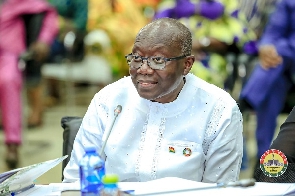 Finance minister Ken Ofori-Atta
Finance minister Ken Ofori-Atta
Ghana’s debt exchange’ programme is a serious economic crisis that requires a collective approach to resolve to put the nation on the right path to economic stability and progress, Mr Bernard Ofori-Adjei, a financial consultant has said.
But, he regretted that the government had not well communicated the debt exchange programme for citizens to well understand, appreciate and accept the dynamics and intricacies, as well as the benefits that the nation stands to gain.
In an interview with the Ghana News Agency (GNA) in Sunyani, Mr Ofori-Adjei stressed that it would be economically suicidal, if the nation failed ‘to get the IMF deal’ passed, saying “the debt exchange has become a national crisis that we all need to jaw to jaw and resolve it.”
“Whether we like it or not it is necessary we do this to get the IMF deal pass or else the nation’s economy will head towards a dangerous path which would be difficult to repair,” Mr Ofori-Adjei stated.
“The nation’s economy is now in a state of dilemma, and we cannot afford to reject the debt exchange programme. But the problem is that the government is not communicating well to the citizens on the debt exchange programme,” he stated.
Currently, Mr Ofori-Adjei said the nation’s external capital market had closed, and the “best option for Ghana now is to go for the IMF deal and debt exchange has become part of the IMF conditionalities.”
“If the debt exchange goes through the government can reduce about US14 million from its total debt which would provide the government space to go to the capital market again to get the IMF support”.
“As we speak now the nation has a total deficit of export cover of over GHC1.5 billion dollars, an indication that currently the nation is in a shortfall in its reserve for international trade, so we need the debt exchange programme to go through the IMF conditionalities”, he stated.
Mr Ofori-Adjei therefore called on everybody to rally behind the government to go through the debt exchange programme, saying “debt and exchange or restructuring has not been easy for any country. Any moment a country takes such a decision, then that country’s economic situation is in a mess.”
“Many people are resisting the debt exchange programme because the government has not communicated well for the people to clearly understand the financial situation of the country,” he stated.
Mr Ofori-Adjei also called on the government to reduce its ministerial portfolios and cut down its presidential staffers to save the nation’s financial coffers.
“In fact, we need the debt exchange programme at all costs to put the nation on the right path to her economic transformation,” he added.